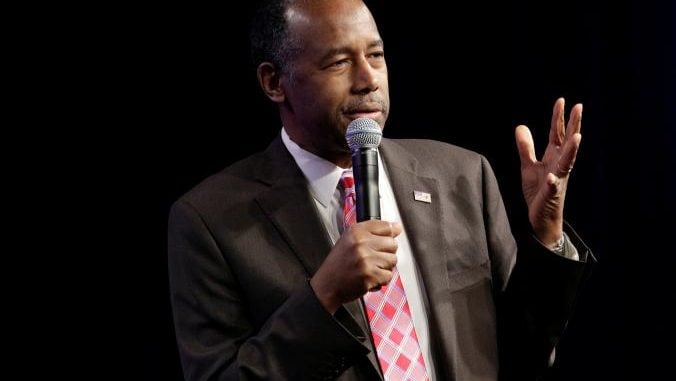
Let’s get one thing straight at the outset: Housing and Urban Development Secretary Ben Carson did not intend to blame poor people for their poverty. He only sounded like he did.”Poverty to a large extent is also a state of mind,” the retired neurosurgeon said during a recent interview on Sirius XM radio.”You take somebody that has the right mindset,” he continued. “You can take everything from them and put them on the street, and I guarantee in a little while they’ll be right back up there.”But if you take somebody with the “wrong mindset,” he said, “you can give them everything in the world, they’ll work their way back to the bottom.”It didn’t take long for a blizzard of sarcastic tweets to explode on Twitter:”Next month,” tweeted Zerlina Maxwell, Sirius XM director of progressive programming, “I’m going to tell my landlord that I paid my rent with positive thinking!””You know what else is a state of mind?” Tweeted Star Trek’s George Takei. “Always being a blithering idiot.”Nor did the timing of Carson’s argument help. It was broadcast right after the Trump administration had asked Congress to cut billions of dollars from housing programs for the poor. At a time when cabinet officers usually fight for more money, Carson seemed ready to surrender.Still, in a follow-up interview with NPR’s Pam Fessler Thursday, Carson softened his earlier comments a bit. State of mind “is a factor,” he said. “A part of poverty can be the state of mind poor in spirit.”Yet a wide variety of experts say the question that Carson raises Does the “wrong mind-set” cause poverty? works better when applied to certain individuals than to broad groups of people. Poverty can be either a cause or an effect of a miserable mindset or both at the same time. It’s stressful to be poor and more stress can lead to more poverty.Like me, Ben Carson didn’t have wealth growing up, but he did have the most valuable resource: a stable, supportive and encouraging home life provided by parents and other elders who were willing to sacrifice for the sake of our upbringing. I understand why he wants other families to have those advantages.But what do you do for the poor kids in families that don’t have even those basic resources? Carson in his first interview offered three major steps of self-help that could lift almost all of the nation’s poor out of poverty: Finish high school, get married and delay childbirth until after marriage.Fine. But as Donald Trump’s campaign illustrated, social and economic turbulence has left millions of working-class people of all races adrift in job loss, marriage breakups, income inequality, and drug addictions.Those troubled households need more than pep talks. Robert Woodson, a black conservative like Carson and president of the Woodson Center (formerly the Center for Neighborhood Enterprise) in Washington, outlined in a telephone interview the “four different types of poor people” he has encountered in more than 2,000 community organizations that the center has assisted with technical and organizational help.At one end are those who are “poor because they’re just broke,” he said. They include a lot of hardworking people whose jobs moved away or who were hit by some other calamity. “They turn to government support temporarily,” said Woodson, “as an ambulance service, not as a transportation system.”At the other end are the people about whom Ben Carson was talking, “a group that is poor because of the chances that they take and the choices that they make,” Woodson said. “This is the group we work with the most.”This group requires more elaborate services, ideally run by neighborhood-based organizations enlisting volunteers from the local community. It may sound far-fetched, but I’ve been out with Woodson on site visits and been amazed at how tirelessly and how well local residents take charge of community improvement, assisted by public-private partnerships, to produce remedies that work.That’s what makes the new administration’s proposed cuts to the HUD budget troubling. They’re asking for cuts before taking a thorough look at what they’re cutting. We may not know everything about what causes poverty, but when you build programs that work to fight poverty, you should try to build more of them.Clarence Page is a syndicated columnist and a member of The Chicago Tribune’s editorial board.



